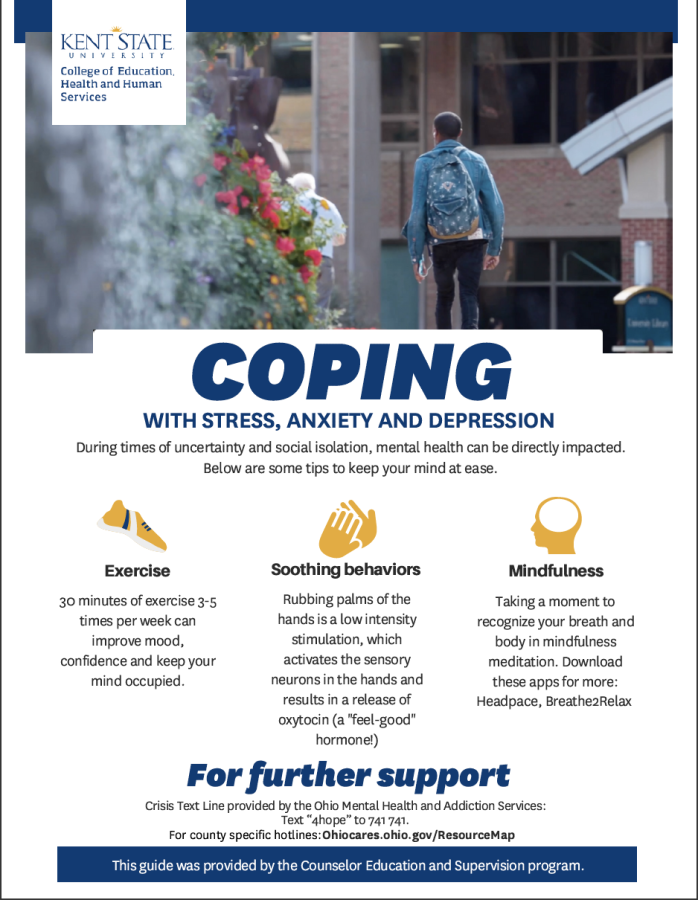Jobs, time management become greater stressors for college students as on online classes, work shifts overlap
May 12, 2021
Before the events of the Covid-19 pandemic, stress of college students who were also working, specifically financial stress, was not a newly developed topic. According to a study conducted by The Ohio State University in 2015, 70% of college students are stressed as a result of their financial situation.
Adam Klerning, a junior advertising major, began working before the pandemic as a way to pay for his education. “I felt that I needed to have a job in order to pay for anything that was not school related such as gas to get to work and emergency purchases that could happen along the way,” he said.
“There are so many what if’s that as a student, I felt like I needed to have a job and make money despite the time it took away from getting homework done or studying for a test,” he continued.
With the restrictions of Covid-19 and jobs being moved to remote or being lost completely, financial burdens became more apparent among college students, according to a Core Spaces study.
Parker Williams, a junior business major, described their experience throughout the pandemic.
“During the pandemic, my financial situation became a huge stressor. I was responsible for paying bills, continuing college and working at my job that never got shut down. This came with a lot of stress because it seemed that it never stopped. I continued to work and pay my bills in order to keep myself afloat,” Williams said.
Once the pandemic was in full effect some students began to also face issues with balancing school and their jobs.
“Even as fall 2020 came, all my classes were online which my job took advantage of and was able to work me harder, but I had to in order to make enough money. With that schedule it made it even more stressful and harder to balance work, school and then try to have a personal life. It was so hard to even get my assignments done on time to where I had no separation which eventually lead to me burning out in the middle of the semester,” Williams said.
Alexus Rayzer, a fourth year public relations major, had continued to work through the pandemic while also attending school with a full time schedule. She describes how working during this time has been hard to balance work, school and personal time.
“I think time management is my biggest struggle. Both school and work can be very time consuming, So I always have to make sure I have all of my school work done before I work during the weekend,” Rayzer said. “The only things that I could do were to try and sleep as much as possible while also making sure I got exercise when I had the time.”
Covid-19 continued to impact many lives and caused fear. “While most adults report experiencing elevated stress due to the COVID-19 pandemic, adults ages 18 to 23 are experiencing the highest stress levels,” according to August survey findings released in October by the American Psychological Association.
Mara Miller, a senior fashion major, held a retail job while also going to school during the lockdown and beginning of the pandemic.
“A major cause of stress while working and going to school, especially during the pandemic, is getting assignments in on time. With online classes, I often have homework due in multiple classes on the same day. It’s harder to divide up time between school and work when everything is virtual,” she said.
Miller said she often brings her laptop to work in order to complete schoolwork on her breaks.
As jobs and financial burdens put stress on students, there are also multiple resources to help students relieve that stress in a healthy way.
Kent State offers multiple types of mental health resources including individual therapy sessions and events on campus such as meditation and yoga.
Dr. Karin Coifman, psychology professor said, “This is a difficult time on a global scale, in my opinion college students have suffered a lot because a lot of what sustained them is something that they have had to give up.”
“It is really important that they take stock of where they are and when they need help they go and get it because those services really are available.”
The resources available to students can be found on the Division of Mental Health website or by going to the DeWeese Health Center on-campus.
Emily MAys covers jobs and money. Contact her at [email protected].












